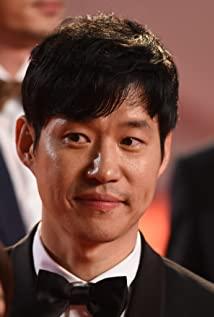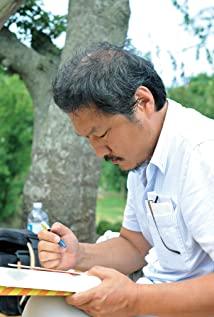Love his magnanimity, hate his magnanimity.
He dissects the things about men and women naked, and dismembers the fantasy of love like a rotten corpse.
He first sprayed perfume on the corpse to confuse you, and then slammed the colorful silk cloth covering the corpse, so that while your nose was full of fragrance, you saw disgusting flesh in your eyes. piece.
He said it was love. Hehe...
Fat brother has said many times, Hong Sang-soo has only made one type of movie in his life, he is constantly burdened with stories about love and cheating, he plays with our familiar desires, and his lines are full of words Embarrassingly, his favorite scene takes place in a Korean restaurant with soju bottles piled high.
His story always crawls from the esophagus to the vagina.
Speak the truth after drinking, see the bastard after drinking.
The simplicity of his images is interspersed with dreams, and the blunt lens pushing and pulling always reminds you that it is like a dream. Stories lead to new possibilities.
His "In a Foreign Land" is still the most familiar Hong Shangxiu movie, but in this movie, he used a foreign heroine for the first time, and it was the ageless little witch, the French legend Isabelle Huppert.
He is quite scheming to throw a foreign stunner into the real Korean society, and compares Korean men to ridiculous animals fed meat. man".
The story of "In a Foreign Land" seems simple, but it is very cleverly constructed. The drama within the play has already made the story have a lot of depth to be discovered. The epiphany-like daydream makes reality and fiction detonate in the intertext. It has more meaning, so that each scene has an extension that can be played over and over again.
"In a Foreign Land" tells the story of an escapist Korean schoolgirl who, in a moment of boredom, prepares to write a script to pass the time.
In her writings, she tells three love stories with similar plots but different characters.
The heroines of the three stories are played by Yu Peier, and their names are Anna.
The stories all take place in a Korean seaside town. As the heroine said, there is nothing worth staying here, it looks dangerous and boring.
For the heroine, here is a dilemma that can only be used to wait.
In the first story, Anna is a female director who went to Korea to meet friends.
That Korean man named Xiu once had an affair with Anna in Paris, and this time the two met in a small town. But things are different, and Xiu's wife follows them with a big belly.
In the film, language is used to create barriers for many times. This transcendence of the Tower of Babel, which ordinary people cannot overcome, has formed a communication barrier and blocked the transmission of love.
In the first story, Xiu's wife is always worried about the man and the foreign woman. Whenever she is dissatisfied, she expresses her anger in Korean and Xiu, but whenever Anna asks the reason, she always speaks in English. Different lies.
While soothing his wife, Xiu hopes to regain the feeling of love. He tells Anna that they are just friends, but he takes Anna's hand after drinking, hoping to kiss Anna again. young souls.
He was melancholy and lost at Anna's imminent departure.
Here Fat Brother skips the second story and goes straight to the third story.
In this story, Anna is a wealthy foreign woman who has just been abandoned. Her husband cheats and is a Korean secretary.
In this story, there is also this Korean couple, but they didn't know each other at first.
After drinking, the Korean man pulled Anna and wanted to tell him a secret. When the two were about to kiss on the beach, they were caught by the man's pot-bellied wife. The old man lied, and Anna was at a loss.
In the film, although this married man changes his identity, he does not forget to remind Anna every time to be careful about Korean men, but he is different from them.
Although he is also a Korean man. Through the results of his behavior, we found that not only Korean men, but all men are the same.
In fact, the protagonists-opponents in "In a Foreign Land" are not Anna and Xiu, but Anna and the coastal lifeguard.
In the three stories, Anna and the lifeguard have intersections, they are the copulation of reality and fantasy.
In the first story, Anna met the lifeguard at sea by chance. The lifeguard said he loved her as soon as he came up, took her to the tent and wrote a song for her, and she confessed to her at the barbecue at night.
But because of Xiu's presence, she deliberately refused.
But the next day, she went to him specially and wrote a note, telling him that she must read the content after she left. In the end, after a long time, the lifeguards with their feet in English couldn't understand the meaning of the note.
In the third story, the lifeguard also accosted Anna, but this time, the newly divorced Anna quickly reassured each other in the tent with the lifeguard.
In all three stories, Anna was looking for the lighthouse in the sea. She found the lifeguard and thought he would know, but it seemed that the lighthouse did not exist. The lifeguard always showed kindness and ambiguity, and he turned himself into that lighthouse. lighthouse.
The first time, Anna chose to escape, the third time, Anna chose to try.
Yes, the movie has a second story!
In the second story, Anna is the wife of the boss of the group. She came to this town to meet her Korean lover.
She also looked for that kind of lighthouse, she found it, but in the end she left, and her conversation with the lifeguard sparked her lover's displeasure.
In the second story, there is a continuous dream within a dream, a play within a play. Anna arrived at the hut early, and the man was delayed because of things.
In unexpected situations, the story breaks with Anna's dream many times. The audience thought it was a reality, but it was actually
just a dream of Anna.
In the end, Anna finally waited for a man at the beach. The two kissed at the beach, and the lifeguard became a voyeur. He was holding a telescope. He wanted to continue to look at the woman who aroused his desire. A scene he didn't think he should have seen.
In the three stories, Anna's love is flawed. The first time is that she may have cheated, the second is cheating, and the third is her partner cheating.
And the lifeguard symbolizes a relief, a chance for Anna to start over.
The first time, Anna gave up, the second time, Anna had no chance to start, and the third time, Anna finally chose to try.
And that lighthouse was the only place Anna expected when she was trapped in this small town. But Anna can't be found, and it's always raining.
This small town is a metaphor for the besieged city of love. The lighthouse is a castle in the air of love and desire. Our self-righteousness about love is an end point that we always expect but never reach.
The blindness of love makes us miss a lot of new roads on the way. The lifeguard may not be able to salvage your injured body or your soul drowning in love, but he will always appear on the way, waiting for us to miss , or wait for us to start together.
In the film, the lifeguard always said in ambiguous English, "I will protect you, if you want to swim, I will protect your safety."
Hong Sangxiu's lines have two functions, one is Create embarrassment and form a plot conflict.
The second is to highlight the meaning outside the words in the intertext. The seemingly plain lines are actually sublimated in the story to an extensional meaning similar to that pointed out by the linguist Barthes, that is, the third meaning of language, a kind of mythological symbol.
Here, the lifeguard's lines suggest a new possibility.
In the first story, the lifeguard jokingly described himself as a beacon of interest to Anna, expecting her to stay. Each time, he emphasized his protector status and his willingness to provide protection.
Anna always said that she could swim and swim well, but she always refused the invitation of the other party.
Language communication is a metaphor for the choice and struggle on the road of love, whether to escape or accept the accident.
Sometimes the dream of the story explodes, making it difficult to tell whether the story is true or false, whether it is Anna's dream or reality. Is it her hope or is it really the result...
In this besieged town of love, Anna indulges in the past, married lover, cheating lover, lost husband, and at the same time encounters a new temptation of love, a lifeguard who never forgets her.
In the third story, at that fork in the road, she finally chose to go to the right, so she became a lifeguard's dream and someone else's dream.
At the end, she found an umbrella on the side of the road, and in the rain, she left lightly.
It's still the familiar scene, the heroine's back, slowly disappearing, the naughty music playing, and the film ends.
Has Anna got out of the siege of love?
Who knows?
Maybe only she knows it!
In reality, why are we not like this, always paying attention to the end point in our imagination, the lighthouse in the sea, we miss the possibility of one after another who want to play our love lifeguard along the way.
Love makes people blind, even in the rain, even in the besieged city, we always love to use dreams to appease our loss, and continue to look for that fantasy beacon.
Backstage reply, in a foreign country, fat brother sent a cheating bible!
View more about In Another Country reviews











